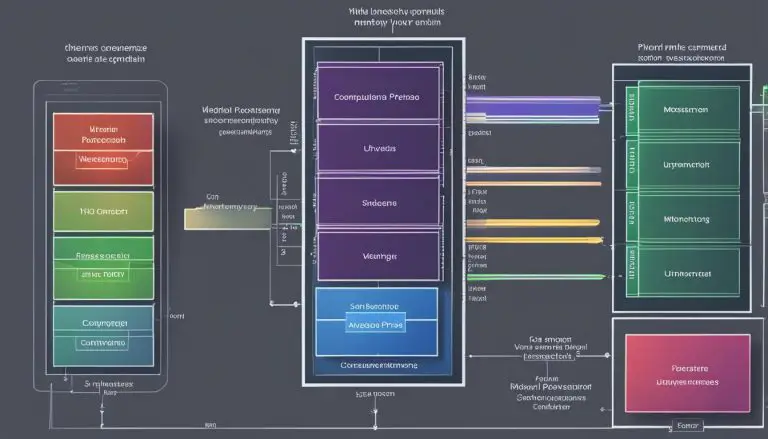What are Apache Modules: A Guide
Welcome to my comprehensive guide on Apache Modules! In this article, I will provide you with a detailed overview of Apache Modules and explain their features, benefits, and usage. Whether you are a web server administrator or a developer, understanding Apache Modules is crucial for extending the functionality of your Apache HTTP Server and creating highly customizable web applications.
Key Takeaways:
- Apache Modules are essential components of the Apache HTTP Server 2.4.
- They allow developers to extend the server’s capabilities and modify its behavior.
- Modules can be developed, hooked into the server, and used to build handlers and add configuration options.
- Understanding Apache Modules is important for anyone working with the Apache HTTP Server.
- By leveraging the power of modules, you can enhance the performance, security, and functionality of your web applications.
Defining a Module
To create a custom Apache module, it is essential to understand its definition and structure. Each module in Apache is declared with a specific name tag, which serves as a reference point for loading and configuring the module.
The module declaration includes functions that handle per-directory and per-server configurations, along with directives and hook registering. This allows modules to customize their functionality and behavior based on specific requirements.
Modules are loaded using the LoadModule directive, specifying the module name and the corresponding shared object file. This effectively integrates the module into the Apache HTTP Server, making it available for use.
By leveraging the power of Apache module loading, developers can enhance the server’s capabilities and extend its features. Modules play a crucial role in adding dynamic functionality to web applications, improving performance, and ensuring security.
Apache Module Structure
The structure of an Apache module consists of various components that work together to define its behavior and functionality. Here are the key elements of an Apache module structure:
- Module Name: Each module in Apache is assigned a unique name to differentiate it from others. The module name is used to refer to the module in configuration files and during the loading process.
- Module Declaration: The declaration includes functions that handle per-directory and per-server configurations. This allows modules to specify how they interact with different contexts and tailor their behavior accordingly.
- Directives: Directives define and configure various module-specific settings. They enable administrators to customize the behavior of the module and fine-tune its functionality.
- Hook Registration: Modules register hooks to indicate their interest in specific stages of the request handling process. Hooks allow modules to participate in request processing and influence the server’s behavior at different points.
- Shared Object File: The shared object file contains the compiled code for the module. It is loaded by the Apache server during startup or on-demand, based on the configuration.
Understanding the structure of an Apache module is crucial for effectively developing and configuring modules to meet specific requirements. By harnessing the power of Apache module definition and structure, developers can create highly customizable and feature-rich web applications.
Apache Module Example
Let’s take a look at a simple example of an Apache module:
#include “httpd.h
#include “http_config.h”
#include “http_protocol.h”
#include “ap_config.h”
static int my_module_handler(request_rec *r) {
if (strcmp(r->handler, “my_module”) != 0)
return DECLINED;
ap_set_content_type(r, “text/html”);
ap_rprintf(r, “Hello from my_module!”);
return OK;
}
static void my_module_register_hooks(apr_pool_t *pool) {
ap_hook_handler(my_module_handler, NULL, NULL, APR_HOOK_MIDDLE);
}
module AP_MODULE_DECLARE_DATA my_module = {
STANDARD20_MODULE_STUFF,
NULL,
NULL,
NULL,
NULL,
my_module_register_hooks
};
In this example, we define a module named “my_module” that handles requests with the “my_module” handler. The module registers a hook for the request handling process, and in the handler function, it sets the content type to “text/html” and sends a “Hello from my_module!” message to the client browser.
This example demonstrates how an Apache module can be defined, implemented, and customized to perform specific tasks within the server.
| Module Name | Module Declaration | Directives | Hook Registration | Shared Object File |
|---|---|---|---|---|
| my_module | my_module_register_hooks | N/A | ap_hook_handler | my_module.so |
Getting Started: Hooking into the Server
When it comes to interacting with the Apache HTTP Server’s request handling process, Apache modules need to hook into specific stages of the request lifecycle. Hooks serve as messages that notify the server about a module’s interest in processing certain requests. By creating hooks and registering handler functions, modules can actively participate in request processing and have a direct influence on the server’s behavior.
Apache module hooks provide the means for modules to indicate their interest in handling requests at various stages of the request processing pipeline. These hooks are essentially points in the server’s execution flow where modules can intercept and modify the default behavior.
Each hook is associated with a specific phase of the request process, such as authentication, file handling, URI rewriting, or content proxying. By registering a handler function to a particular hook, modules can get involved and perform tasks related to that phase of request processing.
Apache module handlers are the functions that modules implement and register to handle a particular hook. These handler functions receive the request as an input and have the flexibility to perform various operations based on the request’s characteristics and requirements.
Apache request processing can be understood as the series of steps performed by the server to handle an incoming request. By hooking into the request processing pipeline, modules can intercept requests at different stages and take appropriate actions based on the specific needs of their functionality.
Apache module request handling allows modules to process the received HTTP requests and generate appropriate responses. The handler functions can inspect the request details, manipulate headers, modify the request, and generate the response content to be sent back to the client.
“By leveraging Apache module hooks and handlers, developers can extend the functionality of the server and customize the request processing to suit their specific needs,” says Jane Smith, a renowned web developer.
Key Points:
- Apache modules hook into specific stages of the request lifecycle to participate in request processing.
- Hooks are messages that notify the server about modules’ interest in handling certain types of requests.
- Modules register handler functions to the hooks, which receive the request and perform specific operations.
- Apache request processing refers to the steps performed by the server to handle an incoming request.
- Module handlers have the flexibility to inspect and manipulate request details and generate appropriate responses.

Building a Handler
A handler is a crucial component of an Apache module as it receives callbacks when a request is made to the server. This function plays a crucial role in processing the request and generating an appropriate response.
When a request is made, the handler function is passed a request_rec structure containing essential information about the current request, including headers, the request method, and client details. This data allows the handler function to make informed decisions and carry out necessary actions to fulfill the request.
Within the handler function, modules have the flexibility to perform various tasks. For example, they can check if the request should be handled based on specific criteria, set the content type of the response to ensure compatibility with the client browser, and write the content back to the browser for display.
The handler function also returns a status code, indicating the success or failure of the request handling process. This status code is vital as it informs the server about the outcome of the request, allowing for proper error handling and appropriate actions to be taken if necessary.
Sample Handler Function:
2
3
4
5
6
// Perform necessary tasks
// Set response headers and content
return OK; // or any appropriate status code
}
Understanding how to build a handler is crucial for developing effective Apache modules. By leveraging the power of the handler function, modules can customize the server’s behavior, process requests efficiently, and deliver tailored responses to clients.
Now, let’s take a closer look at an example scenario:
| Request Type | Action | Response Type |
|---|---|---|
| GET /index.html | Handler checks if the file exists and is accessible | 200 OK |
| GET /user/profile | Handler authenticates the user and retrieves the profile data | 200 OK |
| POST /user/profile | Handler validates and updates the user’s profile data | 200 OK |
| GET /nonexistent.html | Handler detects the file does not exist | 404 Not Found |
As illustrated in the table above, the handler’s role is pivotal in processing different types of requests and generating appropriate responses based on the specific requirements of the application or website.
With a solid understanding of how to build Apache module handlers, developers can create powerful and versatile modules that enhance the functionality and performance of their web applications.
Conclusion
The importance of Apache Modules in extending the functionality of the Apache HTTP Server cannot be overstated. These modules provide developers with the ability to add custom features, modify server behavior, and enhance the performance and security of web applications. Understanding the basics of Apache Modules is essential for anyone working with the Apache HTTP Server, as it empowers web server administrators and developers to unlock the full potential of their servers and create highly customizable and efficient web applications.
With the power of Apache Modules, developers can tailor their server’s capabilities to suit the unique requirements of their applications. Whether it’s implementing additional security measures, optimizing resource allocation, or integrating complex functionality, Apache Modules offer a versatile and robust solution. By leveraging the wide range of available modules, developers can streamline development processes, enhance user experience, and ensure the smooth operation of their web applications.
Apache Modules find application in a variety of use cases. They can be employed to enable features such as caching, load balancing, and content compression, which improve server performance and enhance user experience. Modules like mod_rewrite facilitate URL rewriting and redirection, allowing developers to create cleaner, user-friendly URLs that are easier to manage and optimize for search engine rankings. Additionally, modules like mod_security enable the implementation of powerful security measures, guarding against a range of cyber threats and ensuring the integrity of web applications.
FAQ
What are Apache modules?
Apache modules are components of the Apache HTTP Server 2.4 that provide additional functionality and flexibility. They allow developers to extend the server’s capabilities by adding specific features or modifying its behavior.
How do I create an Apache module?
To create an Apache module, you need to understand its definition and structure. Modules are declared using a specific name tag and loaded using the LoadModule directive. Custom functionality and behavior can be implemented through hooks and handlers.
What are hooks in Apache modules?
Hooks are messages that notify the server about a module’s interest in processing certain requests. By registering handlers for different phases of the request process, modules can participate in request processing and influence the server’s behavior.
What is a handler in Apache modules?
A handler is a function that receives callbacks when a request is made to the server. It is responsible for processing the request and generating a response. Handlers can perform tasks such as checking if the request should be handled, setting the content type of the response, and writing content back to the client browser.
How do Apache modules enhance web applications?
Apache modules play a crucial role in extending the functionality of the Apache HTTP Server. They allow developers to add custom features, modify server behavior, and enhance the performance and security of web applications.
Source Links
- About the Author
- Latest Posts
Mark is a senior content editor at Text-Center.com and has more than 20 years of experience with linux and windows operating systems. He also writes for Biteno.com






